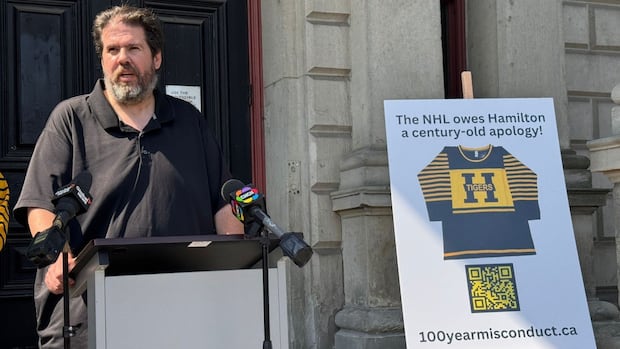Local labour advocates are asking the National Hockey League (NHL) to right what they call a historic wrong when the league punished the city’s NHL team for going on strike in 1925.
“This is an injustice no one has taken accountability for 100 years,” said Anthony Marco, president of the Hamilton and District Labour Council on Wednesday, as he helped launch a campaign that calls on the NHL to apologize for moving the Hamilton Tigers to New York City as a result of the strike.
The Tigers were expected to play six additional games for no additional pay, and refused, demanding an extra $200 in addition to their $3,000 contract.
The five-year-old NHL team was in first place in the league that year and a strong contender for the Stanley Cup, which was then a contest between the NHL winner and that of the Western Canadian Hockey League.
The league responded by moving the team to New York City and making the players write formal apology letters to then-president Frank Calder and pay a $200 fine if they wanted to play in the NHL again.
The campaign launched Wednesday, titled 100 Year Misconduct, includes an online petition asking the NHL to say sorry. Organizers are hoping to get signatures from residents of Hamilton and beyond, hockey fans and professional athletes whose current rights and contracts came after early labour fights such as the stance taken by the Tigers, said Marco.
“Labour stands on the back of people who fought,” he said. “If you’re a hockey fan, this should matter to you.”
‘I’d do the same tomorrow,’ said striking player decades later
The team’s move had emotional and financial impacts on the city of Hamilton that reverberated for many years, says Myer Siemiatycki, a Toronto Metropolitan University politics professor who has researched the Tigers’ strike.

He said the campaign “calls the NHL to account on the travesty they committed to a terrific hockey team and against the city of Hamilton.”
CBC Hamilton sought comment from the NHL but did not hear back on Wednesday.
According to Siemiatycki, Hamilton Tigers captain Shorty Green said at the time that if league owners were going to profit from the extra games, so should the players.
Siemiatycki quoted Green on Wednesday:
“Professional hockey is a money-making affair. The promoters are in the game for what they can make out of it, and the players wouldn’t be in the game if they didn’t look at matters in the same light. Why, then, should we be asked to play two more playoff games for the sake of sweetening the league’s finances?” Green said on the eve of the strike.

“That’s a common refrain that runs through labour history,” Siemiatycki noted. “Workers having to do more work, with the profits and revenues coming to ownership.”
Green went on to play with the New York Americans. He scored the first goal at Madison Square Garden and is an inductee in the Hockey Hall of Fame, alongside fellow Tiger Billy Burch.
Decades after the strike, Green still felt the players did the right thing, said Siemiatycki, who has researched the event.
“I never regretted my part in the strike, even though it cost me a chance in the Stanley Cup,” Siemiatycki quoted Green as saying in a post-retirement interview. “All we asked was that players be given some share of revenue. I’d do the same tomorrow.”
